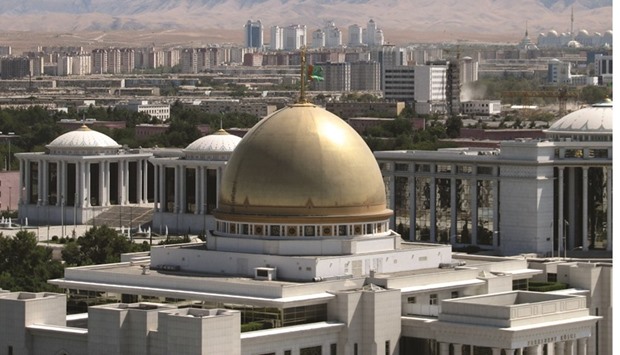Turkmenistan has a rich cultural and civilisational legacy which has generated an extra-ordinary harmony at all levels and throughout the ages. The visit of HH the Emir Sheikh Tamim bin Hamad al-Thani to the capital of Turkmenistan, Ashgabat, would open new prospects for bilateral economic and trade co-operation as well as promote the traditional human ties between the people of the two countries.
Turkmenistan President Gurbanguly Berdimuhamedov emphasised that the visit of HH the Emir to Ashgabat would open new horizons to expand and develop prospects of bilateral co-operation between the two countries on the basis of mutual interest, particularly in the trade and economic sphere.
President Berdimuhamedov welcomed HH the Emir’ s visit stressing its role in promoting traditional human ties between Qatari and Turkmen peoples based on historical, cultural and spiritual unity of the two peoples, Turkmenistan News Agency (TDH) reported.
Berdimuhamedov hailed the high level of bilateral relations between Qatar and Turkmenistan, stressing the importance of Qatari-Turkmenistani talks expected in Ashgabat at the highest levels to move the existing relations between the two countries to a qualitatively new level.
He stressed that the relationship between the two countries would contribute to the development of a fruitful partnership between Turkmenistan and the Middle East.
At the level of Qatar-Turkmenistan relations, earlier this year both ministries of foreign affairs of Qatar and the Republic of Turkmenistan signed an executive programme for bilateral co-operation, guided by a memorandum of consultations signed by the two ministries in Doha in October 2010.
The programme announces the organisation of various activities during 2016-2017, mainly the holding of consultations on bilateral topics, discussions of means of enhancing bilateral relations between the two countries, work within the framework of international organisations and the UN, co-operation in the field of trade and economy and consultations on consular matters, in addition to a number of topics of common interest between the two friendly countries.
The year 2013 also saw the first meeting of the Joint Higher Committee in Ashgabat during which the two sides signed a co-operation protocol for the Qatar-Turkmenistan High Joint Committee on bilateral economic and trade co-operation, energy, transportation as well as education and tourism.
Turkmenistan is a central Asian landlocked country, bordering the Caspian Sea to the west, Iran and Afghanistan to the south, Uzbekistan to the north-east, and Kazakhstan to the north-west.
Turkmenistan occupies an area of 491,200sq km. By area Turkmenistan ranks fourth among the former Soviet republics, after Russia, Kazakhstan and Ukraine.
The great majority of the country’s people are Muslims. Turkmenistan has a cold desert climate that is severely continental. Summers are long (from May through September), hot, and dry, while winters generally are mild and dry. It has the Karakum Desert as well as a number of rivers mainly; Morghab River in southeast and Amu Darya in the east.
Turkmenistan has the third largest reserves of natural gas in the world, estimated at 23tn cu m while its oil reserves are estimated at 600mn barrels ensuring its energy self-sufficiency of oil and gas. The country exports large quantities of gas to Russia, Iran and China and produces gold, silver, uranium, tungsten, gypsum and bentonite. Industry represents about 33.9% of the country’s GDP and the most important industries are fuel, cotton textiles, food and metal processing industries.
The agriculture sector contributes about 24.4% of GDP, cotton is one of the most important agricultural crops. Areas planted with grains and wheat have doubled mainly to three times after the Soviet era. Turkmenistan has well profited of its economic resources by investing in various development projects and sectors, making the country experiencing an architectural and cultural renaissance not only in Ashgabat but also all over Turkmenistan.

Turkmenistan has the third largest reserves of natural gas in the world, estimated at 23tn cu m while its oil reserves are estimated at 600mn barrels ensuring its energy self-sufficiency of oil and gas.
